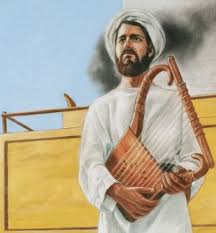The Levitical Gatekeepers for the Temple
First Chronicles 26: 1-19
The Levitical gatekeepers for the Temple DIG: What is this third most important function in Hebrew Temple worship (What were the other two)? What specifically did a gatekeeper do (First Chronicles 26:12 and 9:22-29)? What was the total number of gatekeepers (compare First Chronicles 26:6-11 and 23:5)? Why the vast difference in numbers? Genealogies are loaded with name changes. What variation in Meshelemiah’s name occurs in this very section? Likewise, in Ebiasaph’s name (First Chronicles 6:23 and 9:19)? What do you remember about Obed-Edom (Second Samuel 6:11)? Though not officially a Levite, how might his being “faithful in little” qualify him for adoption into this honored Levitical duty of full-time service? What do you think these guards were like? How did they avoid petty jealousies, like who got the duty at the south gate (the one most often used by the king)?
REFLECT: What security measures do your rabbi or pastor, messianic synagogue or church officers, treasurer, and janitor take that are like the functions of these gatekeepers? Whose responsibility is it to guard the property? To guard organization and constitutional concerns? To guard the Gospel itself? What does your messianic synagogue or church look for in hiring someone to fill one of these “gatekeeper” duties?
David started making the appointments of the Levitical Gatekeepers
for the Temple several years before the end of his life.

The gatekeepers were evidently closely related to the musicians in function since they too were affiliated with Asaph. The divisions of the gatekeepers:
From the Korahites (to see link click Et – The Korahites): Meshelemiah son of Kore, one of the sons of Ebiasaph, which is the spelling given in First Chronicles 9:19. So Asaph appears to be a shorter form of Ebiasaph. The first division of the Korahites was that of Meshelemiah, whose seven sons are said to be Korahites, that is, descendants of Korah, son of Izhar, son of Kohath, son of Levi (Exodus 6:16, 18, 21). Meshelemiah had seven sons: Zechariah the firstborn, Jediael the second, Zebadiah the third, Jathniel the fourth, Elam the fifth, Jehohanan the sixth and Eliehoenai the seventh. Meshelemiah had sons and relatives, who were able men – 18 in all (First Chronicles 26:1-3 and 9).
The second division of the Korahites was that of Obed-Edom. He was a gatekeeper (First Chronicles 26:4), but in recognition of his faithful care of the Ark for three months after David’s first failed attempt to bring the Ark back to Jerusalem, he was honored with a place among the harp players (see Cr – The Ark Brought to Yerushalayim).531 He was the son of Jeduthun (First Chronicles 16:38), one of the three gifted leaders of the Levitical music in the Temple (see Ex – The Musicians for Ministry in the Temple). Obed-Edom also had sons: Shemaiah the firstborn, Jehozabad the second, Joah the third, Sakar the fourth, Nethanel the fifth, Ammiel the sixth, Issachar the seventh and Peullethai the eighth, for YHVH had blessed Obed-Edom (First Chronicles 26:4-5).
The third division of the Korahite gatekeepers consisted of a subdivision of the family of Obed-Edom headed by Shemaiah. He also had sons, who were leaders in their father’s family because they were very capable men. The third generation from Obed-edom, the sons of Shemaiah: Othnai, Rephael, Obed and Elzabad; his relatives Elihu and Semakai were also able men. All these were descendants of Obed-Edom; they and their sons and their relatives were capable men with the strength to do the work – descendants of Obed-Edom, 62 in all. (First Chronicles 26:6-8).
Hosah the Merarite (see Eu – The Merarites) had sons: Shim’i the first (although he was not the firstborn, his father had appointed him the first), Hilkiah the second, Tabaliah the third and Zechariah the fourth. The sons and relatives of Hosah were 13 in all (First Chronicles 26:10-11).
These divisions of the gatekeepers, through their leaders, had duties for ministering in the Temple of ADONAI, just as their relatives had. Lots were cast for each gate, according to their families, young and old alike (First Chronicles 26:12-13).
The lot for East Gate fell to Shelemiah. Then lots were cast (see the commentary on Exodus Gb – The Urim and Thummim: The Means of Making Decisions) for his son Zechariah, a wise counselor, and the lot for the North Gate fell to him. The lot for the South Gate fell to Obed-Edom, and the lot for the storehouse fell to his sons. The lots for the West Gate and the Shalleketh Gate on the upper road fell to Shuppim and Hosah (First Chronicles 26:14-16a).
Each guard was stationed alongside of another guard: There were six Levites a day on the east, four a day on the north, four a day on the south and two at a time at the storehouse. As for the court to the west, there were four at the road and two at the court itself. So there were twenty-two gatekeepers in all at any one time. They were rotated, but their time as a guard was very special because there were four thousand gatekeepers altogether (First Chronicles 23:5). These were the divisions of the gatekeepers who were descendants of Korah and Merari (First Chronicles 26:16b-19). There were three Korahite divisions and one of Merari. The father’s houses of gatekeepers numbered twenty-four: seven of Meshelemiah, thirteen of Obed-Edom and four of Hosah. Therefore, the system of gatekeepers paralleled that of the priests (descendants of Aaron), the Levites (descendants of Levi), the musicians.



Leave A Comment